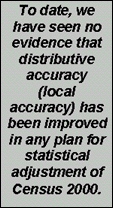
| |    Reporting Responsibility Arguments over the census often concern accuracy – how accurate are the numbers? In the context of the census, "accuracy" has two components: numerical accuracy and distributive accuracy. Numerical accuracy means determining the correct number of people in the country or region. Distributive accuracy means determining where, exactly, those people are.
In 1996, the Supreme Court ruled that counting the number of people in the census is less important than locating where they are. In a unanimous opinion, the Justices wrote, "a preference for distributive accuracy (even at the expense of some numerical accuracy) would seem to follow from the constitutional purpose of the census, viz., to determine the apportionment of the Representatives among the States."8

In other words, accurate state and local counts are more important than an accurate national count. The Court and the Secretary of Commerce both noted that the proposed statistical adjustment in 1990 was progressively less accurate at smaller levels of geography. Questionable local accuracy was a major reason for the Secretary’s decision not to adjust the 1990 census, and the Court’s support of that decision in 1996.9
In 1997, the National Academy of Sciences reported, "With any reasonable sampling scheme that might be used nationally, there will be some levels of aggregation (for example, census blocks) for which the census count would be less precise on average…."
In November 1997, Congress listed the concern over local accuracy first among the reporting requirements for the Census Monitoring Board. The statute reads:
(2) In addition to any matter otherwise required under this subsection, each such report shall address, with respect to the period covered by such report –
(A) the degree to which efforts of the Bureau of the Census to prepare to conduct the 2000 census—
(i) shall achieve maximum possible accuracy at every level of geography;11
In 1998, the Associate Director of the Decennial Census reported continued difficulties with the Bureau’s plans to make statistical adjustments to small areas.12
To date, the Congressional Members of the Census Monitoring Board have seen no evidence that distributive accuracy (herein referred to as local accuracy) has been improved in the Department of Commerce’s plan for statistical adjustment of Census 2000. Additionally, the plan for a non-adjusted census eliminates programs that have improved local accuracy in previous censuses. This report focuses on the issue of local accuracy.
|
   |
|

